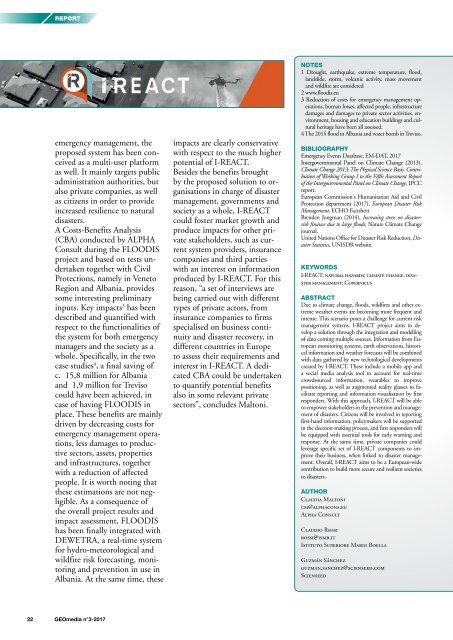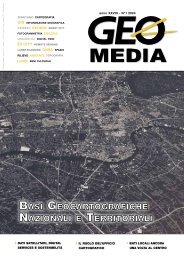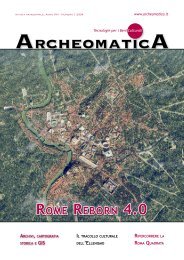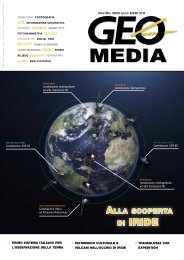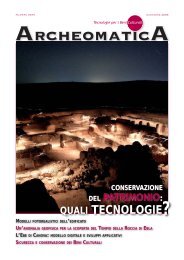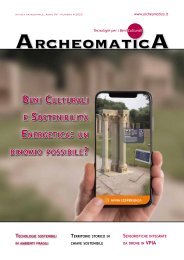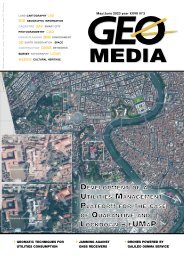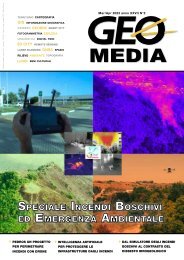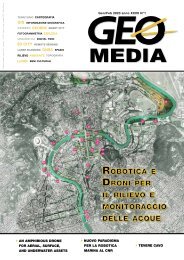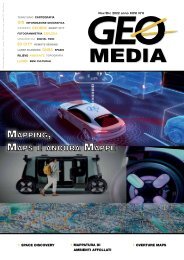GEOmedia 3 2017
You also want an ePaper? Increase the reach of your titles
YUMPU automatically turns print PDFs into web optimized ePapers that Google loves.
REPORT<br />
emergency management, the<br />
proposed system has been conceived<br />
as a multi-user platform<br />
as well. It mainly targets public<br />
administration authorities, but<br />
also private companies, as well<br />
as citizens in order to provide<br />
increased resilience to natural<br />
disasters.<br />
A Costs-Benefits Analysis<br />
(CBA) conducted by ALPHA<br />
Consult during the FLOODIS<br />
project and based on tests undertaken<br />
together with Civil<br />
Protections, namely in Veneto<br />
Region and Albania, provides<br />
some interesting preliminary<br />
inputs. Key impacts 3 has been<br />
described and quantified with<br />
respect to the functionalities of<br />
the system for both emergency<br />
managers and the society as a<br />
whole. Specifically, in the two<br />
case studies 4 , a final saving of<br />
c. €15,8 million for Albania<br />
and €1,9 million for Treviso<br />
could have been achieved, in<br />
case of having FLOODIS in<br />
place. These benefits are mainly<br />
driven by decreasing costs for<br />
emergency management operations,<br />
less damages to productive<br />
sectors, assets, properties<br />
and infrastructures, together<br />
with a reduction of affected<br />
people. It is worth noting that<br />
these estimations are not negligible.<br />
As a consequence of<br />
the overall project results and<br />
impact assessment, FLOODIS<br />
has been finally integrated with<br />
DEWETRA, a real-time system<br />
for hydro-meteorological and<br />
wildfire risk forecasting, monitoring<br />
and prevention in use in<br />
Albania. At the same time, these<br />
impacts are clearly conservative<br />
with respect to the much higher<br />
potential of I-REACT.<br />
Besides the benefits brought<br />
by the proposed solution to organisations<br />
in charge of disaster<br />
management, governments and<br />
society as a whole, I-REACT<br />
could foster market growth and<br />
produce impacts for other private<br />
stakeholders, such as current<br />
system providers, insurance<br />
companies and third parties<br />
with an interest on information<br />
produced by I-REACT. For this<br />
reason, “a set of interviews are<br />
being carried out with different<br />
types of private actors, from<br />
insurance companies to firms<br />
specialised on business continuity<br />
and disaster recovery, in<br />
different countries in Europe<br />
to assess their requirements and<br />
interest in I-REACT. A dedicated<br />
CBA could be undertaken<br />
to quantify potential benefits<br />
also in some relevant private<br />
sectors”, concludes Maltoni.<br />
NOTES<br />
1 Drought, earthquake, extreme temperature, flood,<br />
landslide, storm, volcanic activity, mass movement<br />
and wildfire are considered<br />
2 www.floodis.eu<br />
3 Reduction of costs for emergency management operations,<br />
human losses, affected people, infrastructure<br />
damages and damages to private sector activities, environment,<br />
housing and education buildings and cultural<br />
heritage have been all assessed.<br />
4 The 2015 flood in Albania and water bomb in Treviso.<br />
BIBLIOGRAPHY<br />
Emergency Events Database, EM-DAT, <strong>2017</strong><br />
Intergovernmental Panel on Climate Change (2013),<br />
Climate Change 2013: The Physical Science Basis. Contribution<br />
of Working Group I to the Fifth Assessment Report<br />
of the Intergovernmental Panel on Climate Change, IPCC<br />
report.<br />
European Commission's Humanitarian Aid and Civil<br />
Protection department (<strong>2017</strong>), European Disaster Risk<br />
Management, ECHO Factsheet<br />
Brenden Jongman (2014), Increasing stress on disasterrisk<br />
finance due to large floods, Nature Climate Change<br />
journal.<br />
United Nations Office for Disaster Risk Reduction, Disaster<br />
Statistics, UNISDR website.<br />
KEYWORDS<br />
I-REACT; natural hazards; climate change; disaster<br />
management; Copernicus<br />
ABSTRACT<br />
Due to climate change, floods, wildfires and other extreme<br />
weather events are becoming more frequent and<br />
intense. This scenario poses a challenge for current risk<br />
management systems. I-REACT project aims to develop<br />
a solution through the integration and modelling<br />
of data coming multiple sources. Information from European<br />
monitoring systems, earth observations, historical<br />
information and weather forecasts will be combined<br />
with data gathered by new technological developments<br />
created by I-REACT. These include a mobile app and<br />
a social media analysis tool to account for real-time<br />
crowdsourced information, wearables to improve<br />
positioning, as well as augmented reality glasses to facilitate<br />
reporting and information visualisation by first<br />
responders. With this approach, I-REACT will be able<br />
to empower stakeholders in the prevention and management<br />
of disasters. Citizens will be involved in reporting<br />
first-hand information, policymakers will be supported<br />
in the decision-making process, and first responders will<br />
be equipped with essential tools for early warning and<br />
response. At the same time, private companies could<br />
leverage specific set of I-REACT components to improve<br />
their business, when linked to disaster management.<br />
Overall, I-REACT aims to be a European-wide<br />
contribution to build more secure and resilient societies<br />
to disasters.<br />
AUTHOR<br />
Claudia Maltoni<br />
cm@alphacons.eu<br />
Alpha Consult<br />
Claudio Rossi<br />
rossi@ismb.it<br />
Istituto Superiore Mario Boella<br />
Guzmán Sánchez<br />
guzman.sanchez@scienseed.com<br />
Scienseed<br />
22 <strong>GEOmedia</strong> n°3-<strong>2017</strong>


